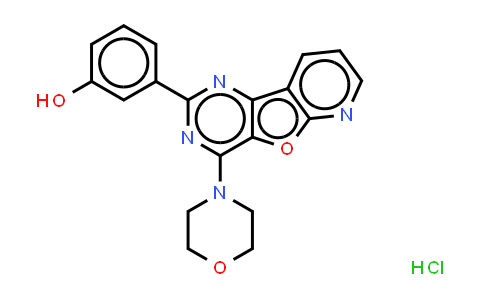Introduction of 371935-79-4 :
PI-103 Hydrochloride is a potent PI3K and mTOR inhibitor with IC50s of 8 nM, 88 nM, 48 nM, 150 nM, 20 nM, and 83 nM for p110α, p110β, p110δ, p110γ, mTORC1, and mTORC2. PI-103 also inhibits DNA-PK with an IC50 of 2 nM. IC50 & Target: IC50: 8 nM (p110α), 88 nM (p110β), 48 nM (p110δ), 150 nM (p110γ), 2 nM (DNA-PK), 20 nM (mTORC1), 83 nM (mTORC2), 26 nM (PI3KC2β), 850 nM (ATR), 920 nM (ATM), ~1 μM (PI3KC2α), 2.3 μM (hsVPS34), ~50 μM (PI4KIIIβ)[4] In Vitro: PI-103 exhibits antiproliferative properties in a panel of human cancer cell lines[1]. PI-103 is essentially cytostatic for cell lines and induced cell cycle arrest in the G1 phase. In blast cells, PI-103 inhibits leukemic proliferation, the clonogenicity of leukemic progenitors and induces mitochondrial apoptosis, especially in the compartment containing leukemic stem cells [2]. PI-103 potently inhibits both the rapamycin-sensitive (mTORC1, IC50=20 nM) and rapamycin-insensitive (mTORC2, IC50=83 nM) complexes of the protein kinase mTOR[4]. In Vivo: PI-103 shows therapeutic activity against a range of human tumor xenografts, exhibiting inhibition of angiogenesis, invasion, and metastasis, as well as direct antiproliferative effects[1]. PI-103 induces immunosuppression promoting in vivo tumor growth and inhibiting apoptosis. Tumors from PI-103-treated mice shows higher levels of cyclin D1 and more proliferating cells[3].
